The Relationship Between Employment Law, Governance, and Business
VerifiedAdded on 2023/06/10
|14
|2932
|164
Essay
AI Summary
This essay examines the multifaceted impact of employment law on business operations, particularly within the UK context. It begins by defining employment law and its role in regulating the relationship between employers and employees, emphasizing the protection of employee rights such as fair wages, safe working conditions, and protection against discrimination. The essay then delves into the principles of corporate governance, including shareholder primacy and transparency, and how these principles intersect with employment law to ensure ethical business practices and accountability. It further analyzes the effects of employment law on various aspects of business operations, such as recruitment, working conditions, and employee contracts. The essay also explores the responsibilities of corporate governance in overseeing these operations, highlighting the importance of compliance with employment laws to avoid legal issues and maintain a positive work environment. Ultimately, the essay underscores the significance of understanding and adhering to employment laws to foster sustainable business practices and protect the interests of both employees and shareholders. The essay also includes a table of contents, introduction, task description, and references.

Writing Essay
Paraphrase This Document
Need a fresh take? Get an instant paraphrase of this document with our AI Paraphraser
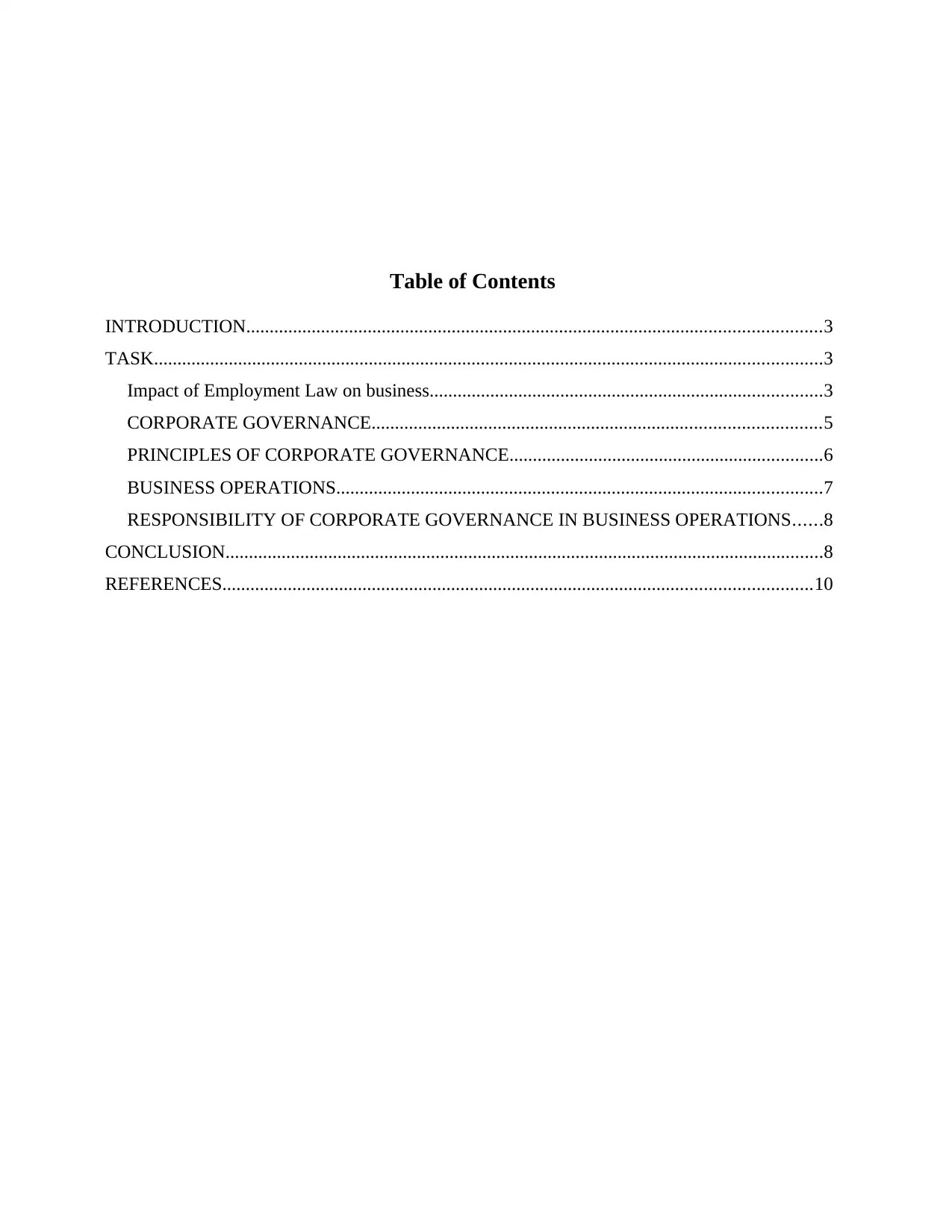
Table of Contents
INTRODUCTION...........................................................................................................................3
TASK...............................................................................................................................................3
Impact of Employment Law on business....................................................................................3
CORPORATE GOVERNANCE................................................................................................5
PRINCIPLES OF CORPORATE GOVERNANCE...................................................................6
BUSINESS OPERATIONS........................................................................................................7
RESPONSIBILITY OF CORPORATE GOVERNANCE IN BUSINESS OPERATIONS......8
CONCLUSION................................................................................................................................8
REFERENCES..............................................................................................................................10
INTRODUCTION...........................................................................................................................3
TASK...............................................................................................................................................3
Impact of Employment Law on business....................................................................................3
CORPORATE GOVERNANCE................................................................................................5
PRINCIPLES OF CORPORATE GOVERNANCE...................................................................6
BUSINESS OPERATIONS........................................................................................................7
RESPONSIBILITY OF CORPORATE GOVERNANCE IN BUSINESS OPERATIONS......8
CONCLUSION................................................................................................................................8
REFERENCES..............................................................................................................................10
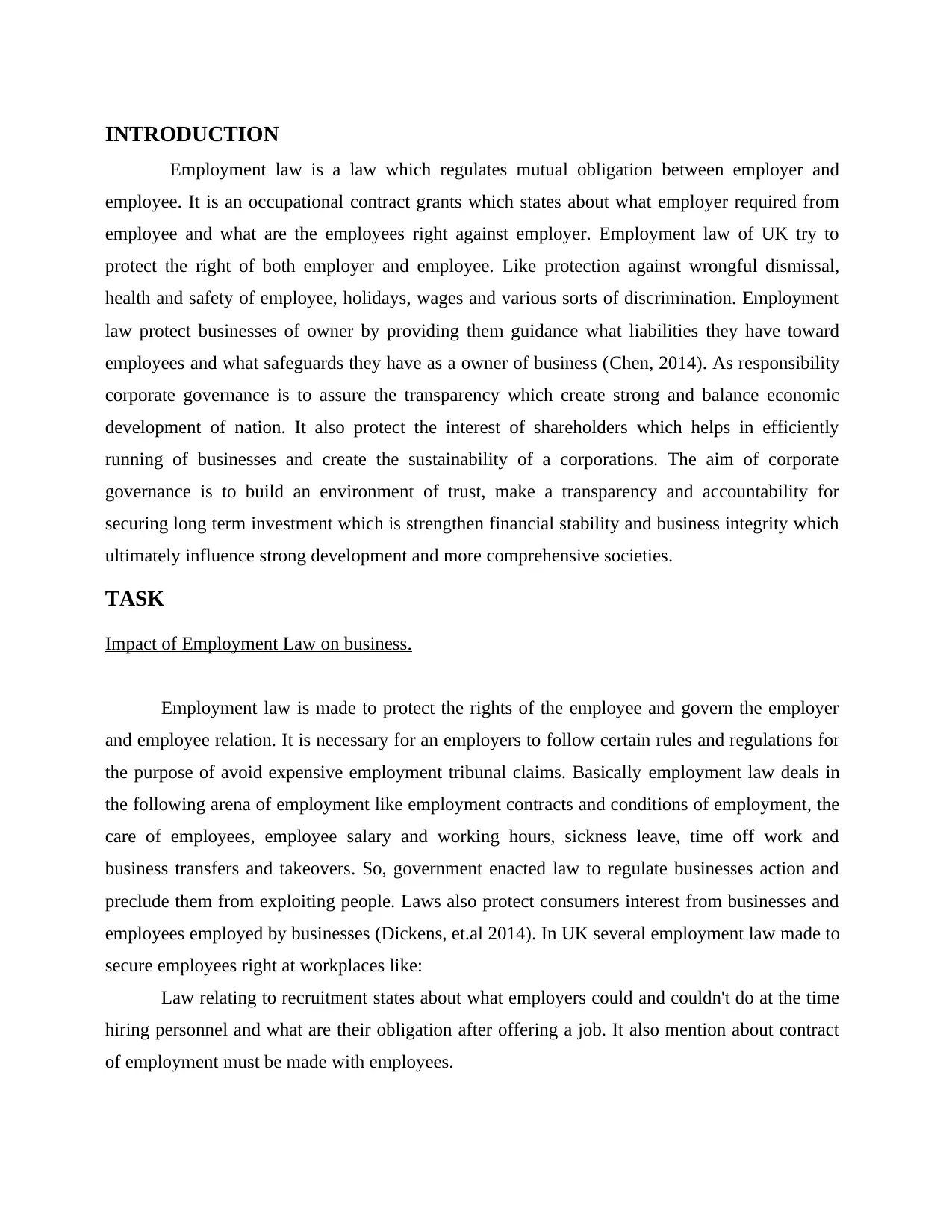
INTRODUCTION
Employment law is a law which regulates mutual obligation between employer and
employee. It is an occupational contract grants which states about what employer required from
employee and what are the employees right against employer. Employment law of UK try to
protect the right of both employer and employee. Like protection against wrongful dismissal,
health and safety of employee, holidays, wages and various sorts of discrimination. Employment
law protect businesses of owner by providing them guidance what liabilities they have toward
employees and what safeguards they have as a owner of business (Chen, 2014). As responsibility
corporate governance is to assure the transparency which create strong and balance economic
development of nation. It also protect the interest of shareholders which helps in efficiently
running of businesses and create the sustainability of a corporations. The aim of corporate
governance is to build an environment of trust, make a transparency and accountability for
securing long term investment which is strengthen financial stability and business integrity which
ultimately influence strong development and more comprehensive societies.
TASK
Impact of Employment Law on business.
Employment law is made to protect the rights of the employee and govern the employer
and employee relation. It is necessary for an employers to follow certain rules and regulations for
the purpose of avoid expensive employment tribunal claims. Basically employment law deals in
the following arena of employment like employment contracts and conditions of employment, the
care of employees, employee salary and working hours, sickness leave, time off work and
business transfers and takeovers. So, government enacted law to regulate businesses action and
preclude them from exploiting people. Laws also protect consumers interest from businesses and
employees employed by businesses (Dickens, et.al 2014). In UK several employment law made to
secure employees right at workplaces like:
Law relating to recruitment states about what employers could and couldn't do at the time
hiring personnel and what are their obligation after offering a job. It also mention about contract
of employment must be made with employees.
Employment law is a law which regulates mutual obligation between employer and
employee. It is an occupational contract grants which states about what employer required from
employee and what are the employees right against employer. Employment law of UK try to
protect the right of both employer and employee. Like protection against wrongful dismissal,
health and safety of employee, holidays, wages and various sorts of discrimination. Employment
law protect businesses of owner by providing them guidance what liabilities they have toward
employees and what safeguards they have as a owner of business (Chen, 2014). As responsibility
corporate governance is to assure the transparency which create strong and balance economic
development of nation. It also protect the interest of shareholders which helps in efficiently
running of businesses and create the sustainability of a corporations. The aim of corporate
governance is to build an environment of trust, make a transparency and accountability for
securing long term investment which is strengthen financial stability and business integrity which
ultimately influence strong development and more comprehensive societies.
TASK
Impact of Employment Law on business.
Employment law is made to protect the rights of the employee and govern the employer
and employee relation. It is necessary for an employers to follow certain rules and regulations for
the purpose of avoid expensive employment tribunal claims. Basically employment law deals in
the following arena of employment like employment contracts and conditions of employment, the
care of employees, employee salary and working hours, sickness leave, time off work and
business transfers and takeovers. So, government enacted law to regulate businesses action and
preclude them from exploiting people. Laws also protect consumers interest from businesses and
employees employed by businesses (Dickens, et.al 2014). In UK several employment law made to
secure employees right at workplaces like:
Law relating to recruitment states about what employers could and couldn't do at the time
hiring personnel and what are their obligation after offering a job. It also mention about contract
of employment must be made with employees.
⊘ This is a preview!⊘
Do you want full access?
Subscribe today to unlock all pages.

Trusted by 1+ million students worldwide
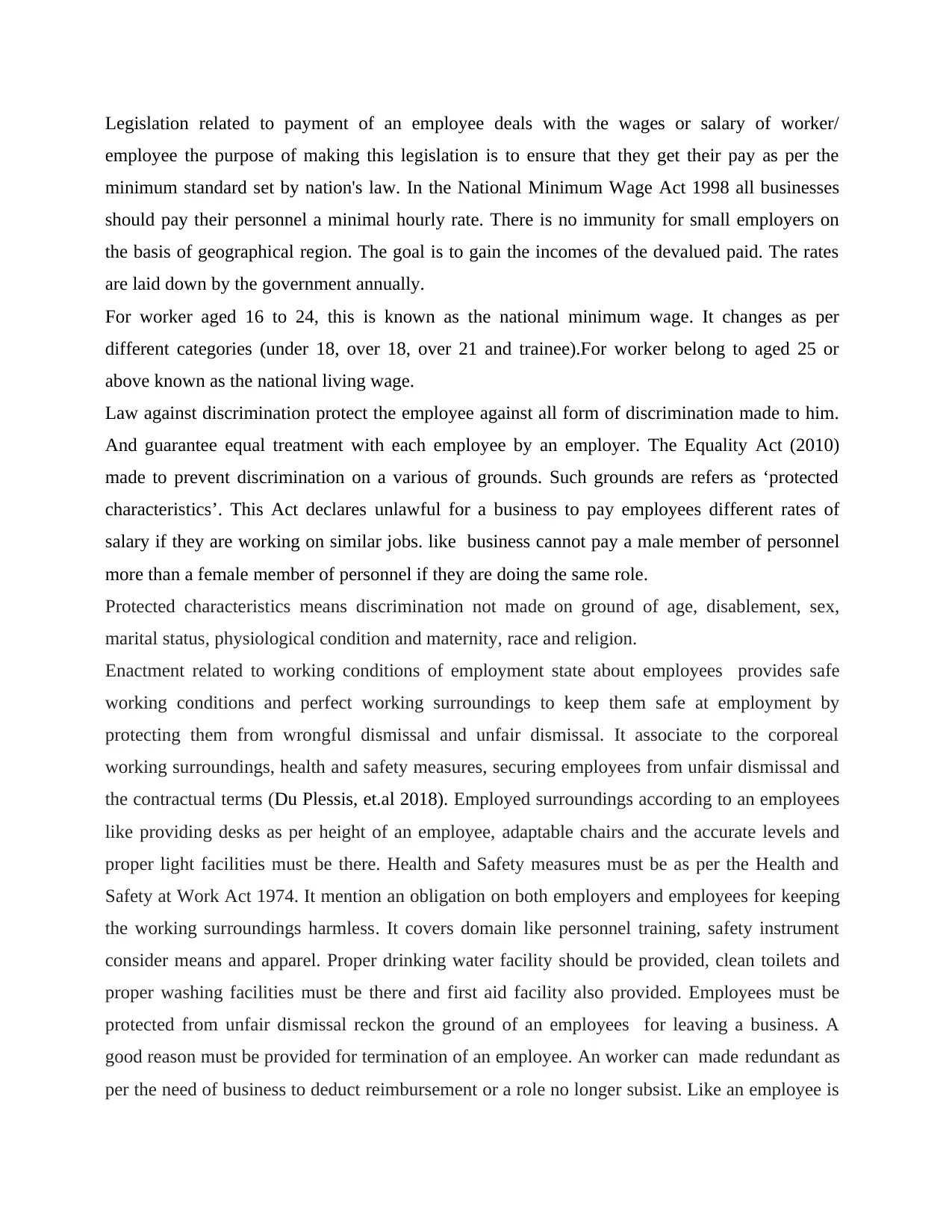
Legislation related to payment of an employee deals with the wages or salary of worker/
employee the purpose of making this legislation is to ensure that they get their pay as per the
minimum standard set by nation's law. In the National Minimum Wage Act 1998 all businesses
should pay their personnel a minimal hourly rate. There is no immunity for small employers on
the basis of geographical region. The goal is to gain the incomes of the devalued paid. The rates
are laid down by the government annually.
For worker aged 16 to 24, this is known as the national minimum wage. It changes as per
different categories (under 18, over 18, over 21 and trainee).For worker belong to aged 25 or
above known as the national living wage.
Law against discrimination protect the employee against all form of discrimination made to him.
And guarantee equal treatment with each employee by an employer. The Equality Act (2010)
made to prevent discrimination on a various of grounds. Such grounds are refers as ‘protected
characteristics’. This Act declares unlawful for a business to pay employees different rates of
salary if they are working on similar jobs. like business cannot pay a male member of personnel
more than a female member of personnel if they are doing the same role.
Protected characteristics means discrimination not made on ground of age, disablement, sex,
marital status, physiological condition and maternity, race and religion.
Enactment related to working conditions of employment state about employees provides safe
working conditions and perfect working surroundings to keep them safe at employment by
protecting them from wrongful dismissal and unfair dismissal. It associate to the corporeal
working surroundings, health and safety measures, securing employees from unfair dismissal and
the contractual terms (Du Plessis, et.al 2018). Employed surroundings according to an employees
like providing desks as per height of an employee, adaptable chairs and the accurate levels and
proper light facilities must be there. Health and Safety measures must be as per the Health and
Safety at Work Act 1974. It mention an obligation on both employers and employees for keeping
the working surroundings harmless. It covers domain like personnel training, safety instrument
consider means and apparel. Proper drinking water facility should be provided, clean toilets and
proper washing facilities must be there and first aid facility also provided. Employees must be
protected from unfair dismissal reckon the ground of an employees for leaving a business. A
good reason must be provided for termination of an employee. An worker can made redundant as
per the need of business to deduct reimbursement or a role no longer subsist. Like an employee is
employee the purpose of making this legislation is to ensure that they get their pay as per the
minimum standard set by nation's law. In the National Minimum Wage Act 1998 all businesses
should pay their personnel a minimal hourly rate. There is no immunity for small employers on
the basis of geographical region. The goal is to gain the incomes of the devalued paid. The rates
are laid down by the government annually.
For worker aged 16 to 24, this is known as the national minimum wage. It changes as per
different categories (under 18, over 18, over 21 and trainee).For worker belong to aged 25 or
above known as the national living wage.
Law against discrimination protect the employee against all form of discrimination made to him.
And guarantee equal treatment with each employee by an employer. The Equality Act (2010)
made to prevent discrimination on a various of grounds. Such grounds are refers as ‘protected
characteristics’. This Act declares unlawful for a business to pay employees different rates of
salary if they are working on similar jobs. like business cannot pay a male member of personnel
more than a female member of personnel if they are doing the same role.
Protected characteristics means discrimination not made on ground of age, disablement, sex,
marital status, physiological condition and maternity, race and religion.
Enactment related to working conditions of employment state about employees provides safe
working conditions and perfect working surroundings to keep them safe at employment by
protecting them from wrongful dismissal and unfair dismissal. It associate to the corporeal
working surroundings, health and safety measures, securing employees from unfair dismissal and
the contractual terms (Du Plessis, et.al 2018). Employed surroundings according to an employees
like providing desks as per height of an employee, adaptable chairs and the accurate levels and
proper light facilities must be there. Health and Safety measures must be as per the Health and
Safety at Work Act 1974. It mention an obligation on both employers and employees for keeping
the working surroundings harmless. It covers domain like personnel training, safety instrument
consider means and apparel. Proper drinking water facility should be provided, clean toilets and
proper washing facilities must be there and first aid facility also provided. Employees must be
protected from unfair dismissal reckon the ground of an employees for leaving a business. A
good reason must be provided for termination of an employee. An worker can made redundant as
per the need of business to deduct reimbursement or a role no longer subsist. Like an employee is
Paraphrase This Document
Need a fresh take? Get an instant paraphrase of this document with our AI Paraphraser
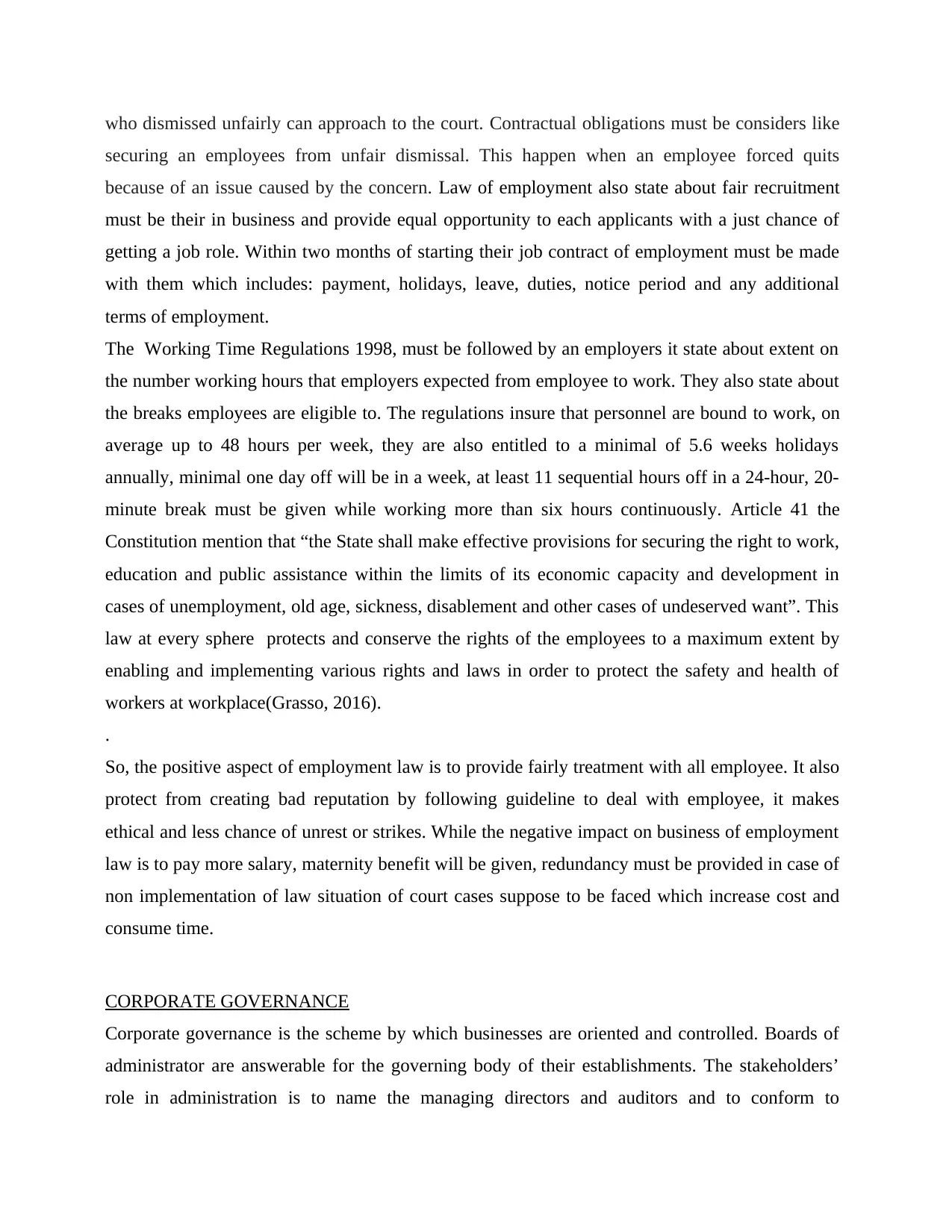
who dismissed unfairly can approach to the court. Contractual obligations must be considers like
securing an employees from unfair dismissal. This happen when an employee forced quits
because of an issue caused by the concern. Law of employment also state about fair recruitment
must be their in business and provide equal opportunity to each applicants with a just chance of
getting a job role. Within two months of starting their job contract of employment must be made
with them which includes: payment, holidays, leave, duties, notice period and any additional
terms of employment.
The Working Time Regulations 1998, must be followed by an employers it state about extent on
the number working hours that employers expected from employee to work. They also state about
the breaks employees are eligible to. The regulations insure that personnel are bound to work, on
average up to 48 hours per week, they are also entitled to a minimal of 5.6 weeks holidays
annually, minimal one day off will be in a week, at least 11 sequential hours off in a 24-hour, 20-
minute break must be given while working more than six hours continuously. Article 41 the
Constitution mention that “the State shall make effective provisions for securing the right to work,
education and public assistance within the limits of its economic capacity and development in
cases of unemployment, old age, sickness, disablement and other cases of undeserved want”. This
law at every sphere protects and conserve the rights of the employees to a maximum extent by
enabling and implementing various rights and laws in order to protect the safety and health of
workers at workplace(Grasso, 2016).
.
So, the positive aspect of employment law is to provide fairly treatment with all employee. It also
protect from creating bad reputation by following guideline to deal with employee, it makes
ethical and less chance of unrest or strikes. While the negative impact on business of employment
law is to pay more salary, maternity benefit will be given, redundancy must be provided in case of
non implementation of law situation of court cases suppose to be faced which increase cost and
consume time.
CORPORATE GOVERNANCE
Corporate governance is the scheme by which businesses are oriented and controlled. Boards of
administrator are answerable for the governing body of their establishments. The stakeholders’
role in administration is to name the managing directors and auditors and to conform to
securing an employees from unfair dismissal. This happen when an employee forced quits
because of an issue caused by the concern. Law of employment also state about fair recruitment
must be their in business and provide equal opportunity to each applicants with a just chance of
getting a job role. Within two months of starting their job contract of employment must be made
with them which includes: payment, holidays, leave, duties, notice period and any additional
terms of employment.
The Working Time Regulations 1998, must be followed by an employers it state about extent on
the number working hours that employers expected from employee to work. They also state about
the breaks employees are eligible to. The regulations insure that personnel are bound to work, on
average up to 48 hours per week, they are also entitled to a minimal of 5.6 weeks holidays
annually, minimal one day off will be in a week, at least 11 sequential hours off in a 24-hour, 20-
minute break must be given while working more than six hours continuously. Article 41 the
Constitution mention that “the State shall make effective provisions for securing the right to work,
education and public assistance within the limits of its economic capacity and development in
cases of unemployment, old age, sickness, disablement and other cases of undeserved want”. This
law at every sphere protects and conserve the rights of the employees to a maximum extent by
enabling and implementing various rights and laws in order to protect the safety and health of
workers at workplace(Grasso, 2016).
.
So, the positive aspect of employment law is to provide fairly treatment with all employee. It also
protect from creating bad reputation by following guideline to deal with employee, it makes
ethical and less chance of unrest or strikes. While the negative impact on business of employment
law is to pay more salary, maternity benefit will be given, redundancy must be provided in case of
non implementation of law situation of court cases suppose to be faced which increase cost and
consume time.
CORPORATE GOVERNANCE
Corporate governance is the scheme by which businesses are oriented and controlled. Boards of
administrator are answerable for the governing body of their establishments. The stakeholders’
role in administration is to name the managing directors and auditors and to conform to
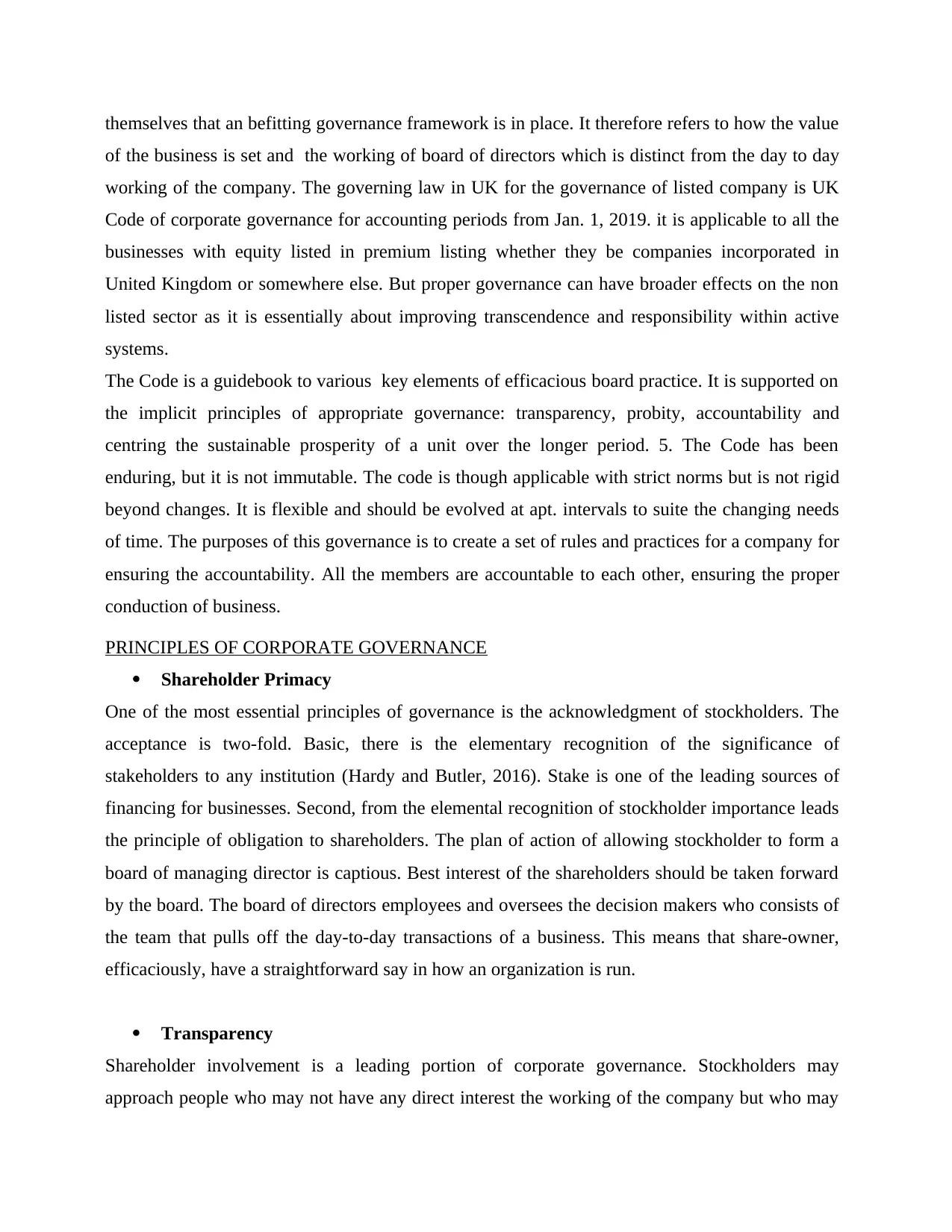
themselves that an befitting governance framework is in place. It therefore refers to how the value
of the business is set and the working of board of directors which is distinct from the day to day
working of the company. The governing law in UK for the governance of listed company is UK
Code of corporate governance for accounting periods from Jan. 1, 2019. it is applicable to all the
businesses with equity listed in premium listing whether they be companies incorporated in
United Kingdom or somewhere else. But proper governance can have broader effects on the non
listed sector as it is essentially about improving transcendence and responsibility within active
systems.
The Code is a guidebook to various key elements of efficacious board practice. It is supported on
the implicit principles of appropriate governance: transparency, probity, accountability and
centring the sustainable prosperity of a unit over the longer period. 5. The Code has been
enduring, but it is not immutable. The code is though applicable with strict norms but is not rigid
beyond changes. It is flexible and should be evolved at apt. intervals to suite the changing needs
of time. The purposes of this governance is to create a set of rules and practices for a company for
ensuring the accountability. All the members are accountable to each other, ensuring the proper
conduction of business.
PRINCIPLES OF CORPORATE GOVERNANCE
Shareholder Primacy
One of the most essential principles of governance is the acknowledgment of stockholders. The
acceptance is two-fold. Basic, there is the elementary recognition of the significance of
stakeholders to any institution (Hardy and Butler, 2016). Stake is one of the leading sources of
financing for businesses. Second, from the elemental recognition of stockholder importance leads
the principle of obligation to shareholders. The plan of action of allowing stockholder to form a
board of managing director is captious. Best interest of the shareholders should be taken forward
by the board. The board of directors employees and oversees the decision makers who consists of
the team that pulls off the day-to-day transactions of a business. This means that share-owner,
efficaciously, have a straightforward say in how an organization is run.
Transparency
Shareholder involvement is a leading portion of corporate governance. Stockholders may
approach people who may not have any direct interest the working of the company but who may
of the business is set and the working of board of directors which is distinct from the day to day
working of the company. The governing law in UK for the governance of listed company is UK
Code of corporate governance for accounting periods from Jan. 1, 2019. it is applicable to all the
businesses with equity listed in premium listing whether they be companies incorporated in
United Kingdom or somewhere else. But proper governance can have broader effects on the non
listed sector as it is essentially about improving transcendence and responsibility within active
systems.
The Code is a guidebook to various key elements of efficacious board practice. It is supported on
the implicit principles of appropriate governance: transparency, probity, accountability and
centring the sustainable prosperity of a unit over the longer period. 5. The Code has been
enduring, but it is not immutable. The code is though applicable with strict norms but is not rigid
beyond changes. It is flexible and should be evolved at apt. intervals to suite the changing needs
of time. The purposes of this governance is to create a set of rules and practices for a company for
ensuring the accountability. All the members are accountable to each other, ensuring the proper
conduction of business.
PRINCIPLES OF CORPORATE GOVERNANCE
Shareholder Primacy
One of the most essential principles of governance is the acknowledgment of stockholders. The
acceptance is two-fold. Basic, there is the elementary recognition of the significance of
stakeholders to any institution (Hardy and Butler, 2016). Stake is one of the leading sources of
financing for businesses. Second, from the elemental recognition of stockholder importance leads
the principle of obligation to shareholders. The plan of action of allowing stockholder to form a
board of managing director is captious. Best interest of the shareholders should be taken forward
by the board. The board of directors employees and oversees the decision makers who consists of
the team that pulls off the day-to-day transactions of a business. This means that share-owner,
efficaciously, have a straightforward say in how an organization is run.
Transparency
Shareholder involvement is a leading portion of corporate governance. Stockholders may
approach people who may not have any direct interest the working of the company but who may
⊘ This is a preview!⊘
Do you want full access?
Subscribe today to unlock all pages.

Trusted by 1+ million students worldwide
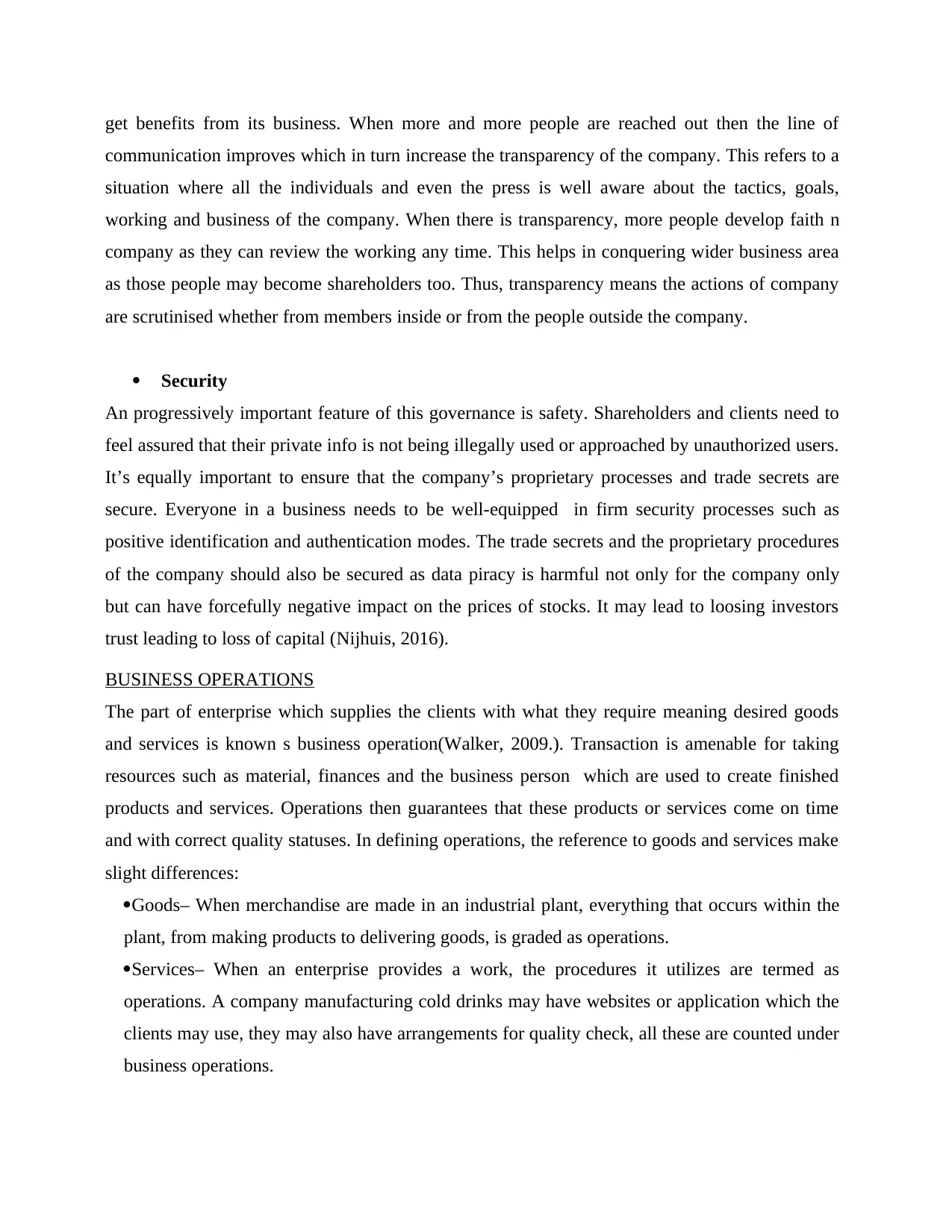
get benefits from its business. When more and more people are reached out then the line of
communication improves which in turn increase the transparency of the company. This refers to a
situation where all the individuals and even the press is well aware about the tactics, goals,
working and business of the company. When there is transparency, more people develop faith n
company as they can review the working any time. This helps in conquering wider business area
as those people may become shareholders too. Thus, transparency means the actions of company
are scrutinised whether from members inside or from the people outside the company.
Security
An progressively important feature of this governance is safety. Shareholders and clients need to
feel assured that their private info is not being illegally used or approached by unauthorized users.
It’s equally important to ensure that the company’s proprietary processes and trade secrets are
secure. Everyone in a business needs to be well-equipped in firm security processes such as
positive identification and authentication modes. The trade secrets and the proprietary procedures
of the company should also be secured as data piracy is harmful not only for the company only
but can have forcefully negative impact on the prices of stocks. It may lead to loosing investors
trust leading to loss of capital (Nijhuis, 2016).
BUSINESS OPERATIONS
The part of enterprise which supplies the clients with what they require meaning desired goods
and services is known s business operation(Walker, 2009.). Transaction is amenable for taking
resources such as material, finances and the business person which are used to create finished
products and services. Operations then guarantees that these products or services come on time
and with correct quality statuses. In defining operations, the reference to goods and services make
slight differences:
Goods– When merchandise are made in an industrial plant, everything that occurs within the
plant, from making products to delivering goods, is graded as operations.
Services– When an enterprise provides a work, the procedures it utilizes are termed as
operations. A company manufacturing cold drinks may have websites or application which the
clients may use, they may also have arrangements for quality check, all these are counted under
business operations.
communication improves which in turn increase the transparency of the company. This refers to a
situation where all the individuals and even the press is well aware about the tactics, goals,
working and business of the company. When there is transparency, more people develop faith n
company as they can review the working any time. This helps in conquering wider business area
as those people may become shareholders too. Thus, transparency means the actions of company
are scrutinised whether from members inside or from the people outside the company.
Security
An progressively important feature of this governance is safety. Shareholders and clients need to
feel assured that their private info is not being illegally used or approached by unauthorized users.
It’s equally important to ensure that the company’s proprietary processes and trade secrets are
secure. Everyone in a business needs to be well-equipped in firm security processes such as
positive identification and authentication modes. The trade secrets and the proprietary procedures
of the company should also be secured as data piracy is harmful not only for the company only
but can have forcefully negative impact on the prices of stocks. It may lead to loosing investors
trust leading to loss of capital (Nijhuis, 2016).
BUSINESS OPERATIONS
The part of enterprise which supplies the clients with what they require meaning desired goods
and services is known s business operation(Walker, 2009.). Transaction is amenable for taking
resources such as material, finances and the business person which are used to create finished
products and services. Operations then guarantees that these products or services come on time
and with correct quality statuses. In defining operations, the reference to goods and services make
slight differences:
Goods– When merchandise are made in an industrial plant, everything that occurs within the
plant, from making products to delivering goods, is graded as operations.
Services– When an enterprise provides a work, the procedures it utilizes are termed as
operations. A company manufacturing cold drinks may have websites or application which the
clients may use, they may also have arrangements for quality check, all these are counted under
business operations.
Paraphrase This Document
Need a fresh take? Get an instant paraphrase of this document with our AI Paraphraser
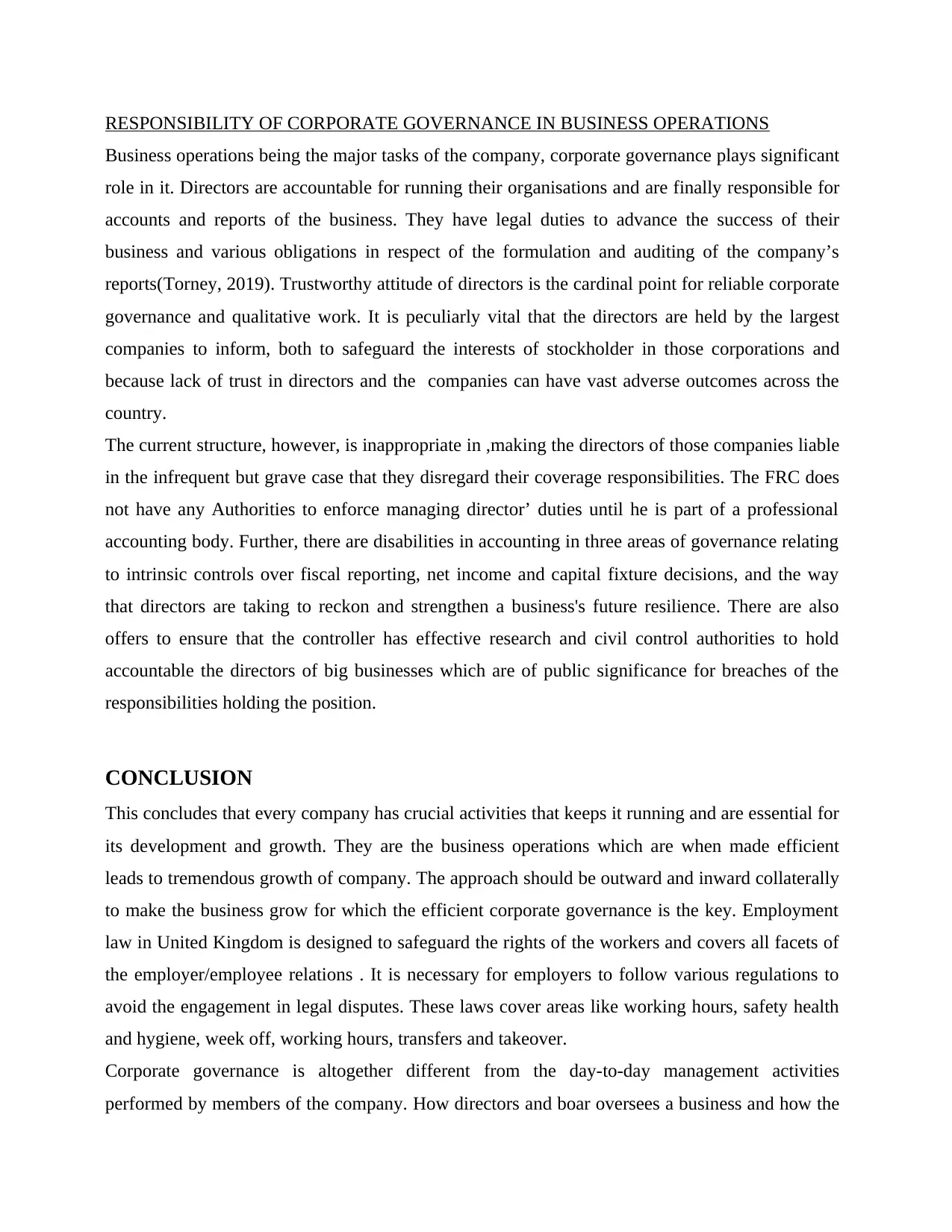
RESPONSIBILITY OF CORPORATE GOVERNANCE IN BUSINESS OPERATIONS
Business operations being the major tasks of the company, corporate governance plays significant
role in it. Directors are accountable for running their organisations and are finally responsible for
accounts and reports of the business. They have legal duties to advance the success of their
business and various obligations in respect of the formulation and auditing of the company’s
reports(Torney, 2019). Trustworthy attitude of directors is the cardinal point for reliable corporate
governance and qualitative work. It is peculiarly vital that the directors are held by the largest
companies to inform, both to safeguard the interests of stockholder in those corporations and
because lack of trust in directors and the companies can have vast adverse outcomes across the
country.
The current structure, however, is inappropriate in ,making the directors of those companies liable
in the infrequent but grave case that they disregard their coverage responsibilities. The FRC does
not have any Authorities to enforce managing director’ duties until he is part of a professional
accounting body. Further, there are disabilities in accounting in three areas of governance relating
to intrinsic controls over fiscal reporting, net income and capital fixture decisions, and the way
that directors are taking to reckon and strengthen a business's future resilience. There are also
offers to ensure that the controller has effective research and civil control authorities to hold
accountable the directors of big businesses which are of public significance for breaches of the
responsibilities holding the position.
CONCLUSION
This concludes that every company has crucial activities that keeps it running and are essential for
its development and growth. They are the business operations which are when made efficient
leads to tremendous growth of company. The approach should be outward and inward collaterally
to make the business grow for which the efficient corporate governance is the key. Employment
law in United Kingdom is designed to safeguard the rights of the workers and covers all facets of
the employer/employee relations . It is necessary for employers to follow various regulations to
avoid the engagement in legal disputes. These laws cover areas like working hours, safety health
and hygiene, week off, working hours, transfers and takeover.
Corporate governance is altogether different from the day-to-day management activities
performed by members of the company. How directors and boar oversees a business and how the
Business operations being the major tasks of the company, corporate governance plays significant
role in it. Directors are accountable for running their organisations and are finally responsible for
accounts and reports of the business. They have legal duties to advance the success of their
business and various obligations in respect of the formulation and auditing of the company’s
reports(Torney, 2019). Trustworthy attitude of directors is the cardinal point for reliable corporate
governance and qualitative work. It is peculiarly vital that the directors are held by the largest
companies to inform, both to safeguard the interests of stockholder in those corporations and
because lack of trust in directors and the companies can have vast adverse outcomes across the
country.
The current structure, however, is inappropriate in ,making the directors of those companies liable
in the infrequent but grave case that they disregard their coverage responsibilities. The FRC does
not have any Authorities to enforce managing director’ duties until he is part of a professional
accounting body. Further, there are disabilities in accounting in three areas of governance relating
to intrinsic controls over fiscal reporting, net income and capital fixture decisions, and the way
that directors are taking to reckon and strengthen a business's future resilience. There are also
offers to ensure that the controller has effective research and civil control authorities to hold
accountable the directors of big businesses which are of public significance for breaches of the
responsibilities holding the position.
CONCLUSION
This concludes that every company has crucial activities that keeps it running and are essential for
its development and growth. They are the business operations which are when made efficient
leads to tremendous growth of company. The approach should be outward and inward collaterally
to make the business grow for which the efficient corporate governance is the key. Employment
law in United Kingdom is designed to safeguard the rights of the workers and covers all facets of
the employer/employee relations . It is necessary for employers to follow various regulations to
avoid the engagement in legal disputes. These laws cover areas like working hours, safety health
and hygiene, week off, working hours, transfers and takeover.
Corporate governance is altogether different from the day-to-day management activities
performed by members of the company. How directors and boar oversees a business and how the
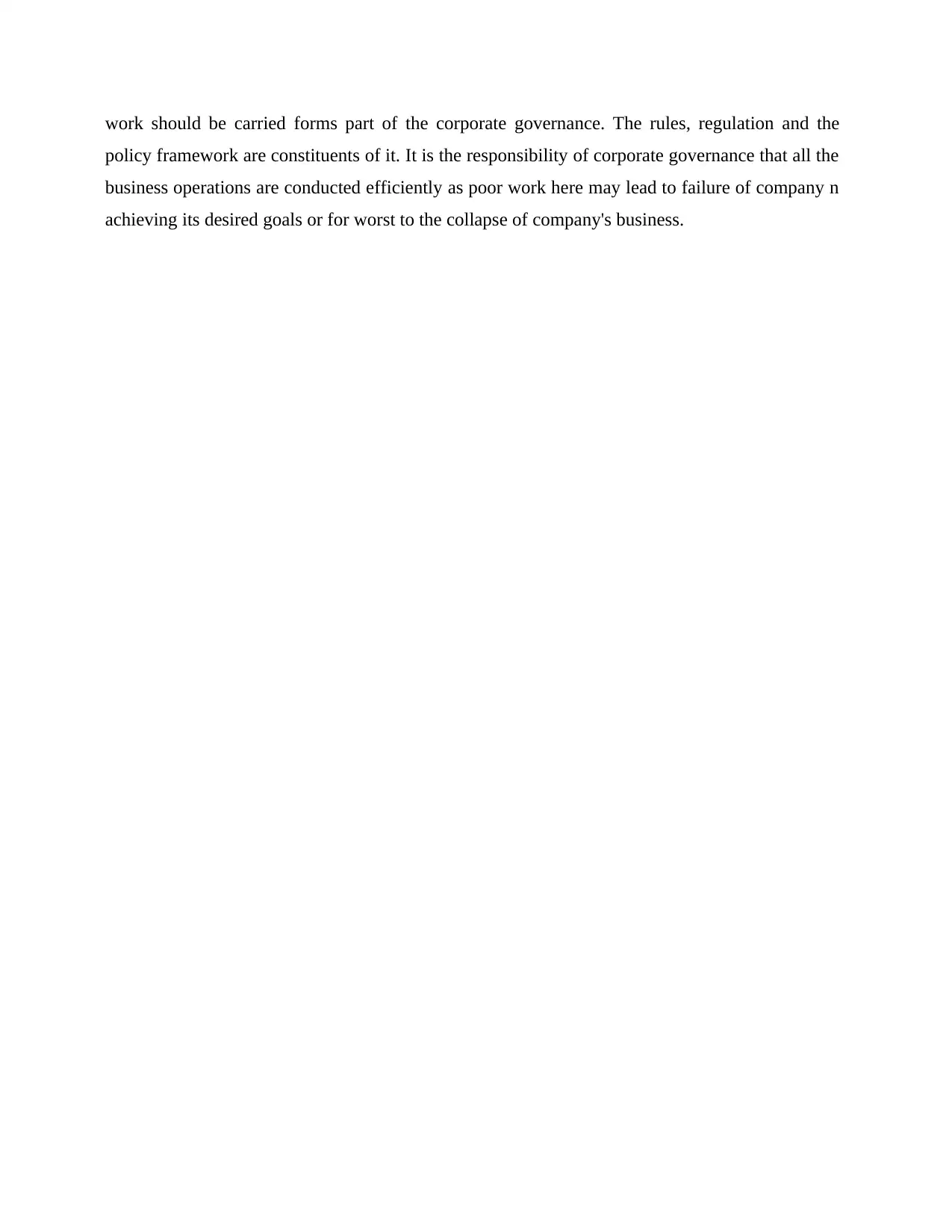
work should be carried forms part of the corporate governance. The rules, regulation and the
policy framework are constituents of it. It is the responsibility of corporate governance that all the
business operations are conducted efficiently as poor work here may lead to failure of company n
achieving its desired goals or for worst to the collapse of company's business.
policy framework are constituents of it. It is the responsibility of corporate governance that all the
business operations are conducted efficiently as poor work here may lead to failure of company n
achieving its desired goals or for worst to the collapse of company's business.
⊘ This is a preview!⊘
Do you want full access?
Subscribe today to unlock all pages.

Trusted by 1+ million students worldwide
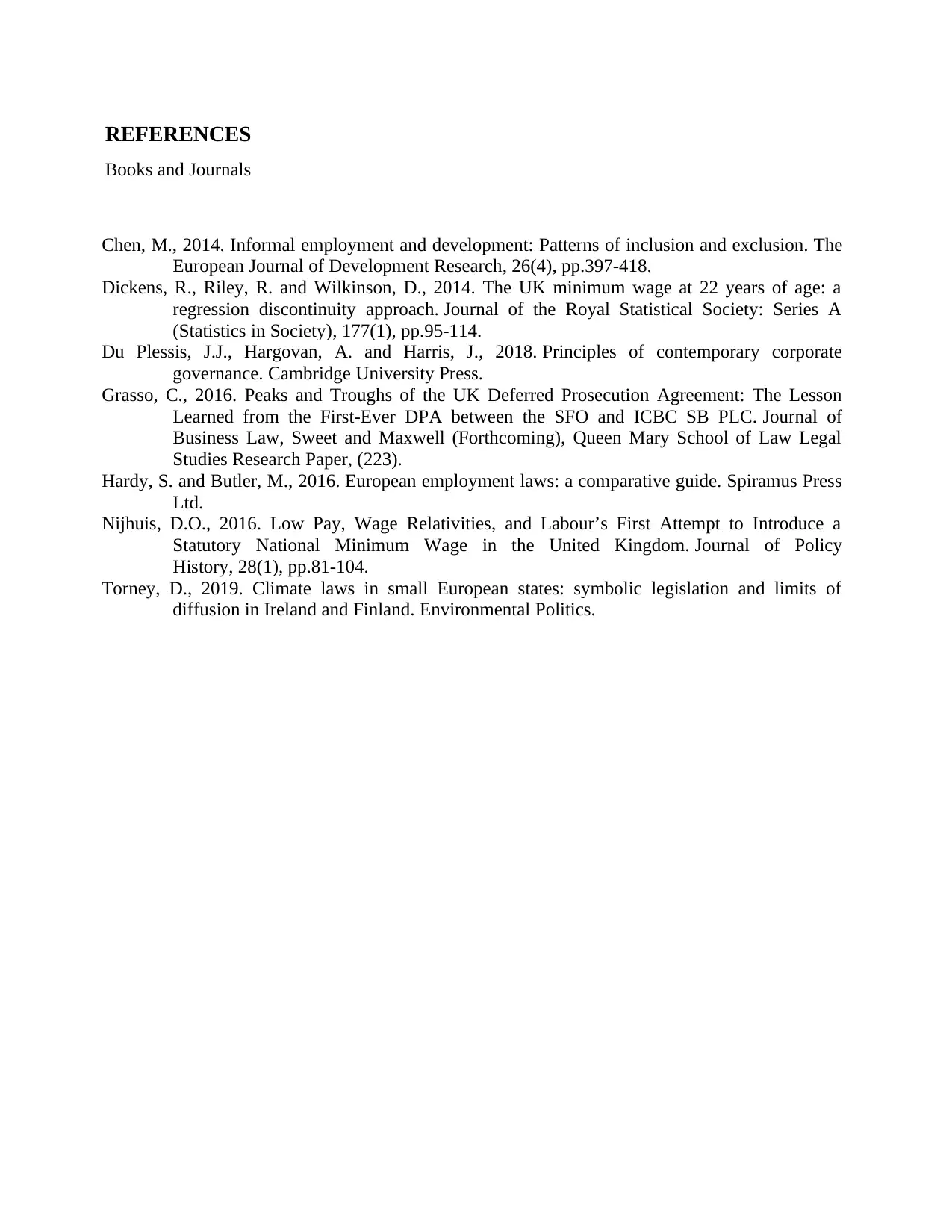
REFERENCES
Books and Journals
Chen, M., 2014. Informal employment and development: Patterns of inclusion and exclusion. The
European Journal of Development Research, 26(4), pp.397-418.
Dickens, R., Riley, R. and Wilkinson, D., 2014. The UK minimum wage at 22 years of age: a
regression discontinuity approach. Journal of the Royal Statistical Society: Series A
(Statistics in Society), 177(1), pp.95-114.
Du Plessis, J.J., Hargovan, A. and Harris, J., 2018. Principles of contemporary corporate
governance. Cambridge University Press.
Grasso, C., 2016. Peaks and Troughs of the UK Deferred Prosecution Agreement: The Lesson
Learned from the First-Ever DPA between the SFO and ICBC SB PLC. Journal of
Business Law, Sweet and Maxwell (Forthcoming), Queen Mary School of Law Legal
Studies Research Paper, (223).
Hardy, S. and Butler, M., 2016. European employment laws: a comparative guide. Spiramus Press
Ltd.
Nijhuis, D.O., 2016. Low Pay, Wage Relativities, and Labour’s First Attempt to Introduce a
Statutory National Minimum Wage in the United Kingdom. Journal of Policy
History, 28(1), pp.81-104.
Torney, D., 2019. Climate laws in small European states: symbolic legislation and limits of
diffusion in Ireland and Finland. Environmental Politics.
Books and Journals
Chen, M., 2014. Informal employment and development: Patterns of inclusion and exclusion. The
European Journal of Development Research, 26(4), pp.397-418.
Dickens, R., Riley, R. and Wilkinson, D., 2014. The UK minimum wage at 22 years of age: a
regression discontinuity approach. Journal of the Royal Statistical Society: Series A
(Statistics in Society), 177(1), pp.95-114.
Du Plessis, J.J., Hargovan, A. and Harris, J., 2018. Principles of contemporary corporate
governance. Cambridge University Press.
Grasso, C., 2016. Peaks and Troughs of the UK Deferred Prosecution Agreement: The Lesson
Learned from the First-Ever DPA between the SFO and ICBC SB PLC. Journal of
Business Law, Sweet and Maxwell (Forthcoming), Queen Mary School of Law Legal
Studies Research Paper, (223).
Hardy, S. and Butler, M., 2016. European employment laws: a comparative guide. Spiramus Press
Ltd.
Nijhuis, D.O., 2016. Low Pay, Wage Relativities, and Labour’s First Attempt to Introduce a
Statutory National Minimum Wage in the United Kingdom. Journal of Policy
History, 28(1), pp.81-104.
Torney, D., 2019. Climate laws in small European states: symbolic legislation and limits of
diffusion in Ireland and Finland. Environmental Politics.
Paraphrase This Document
Need a fresh take? Get an instant paraphrase of this document with our AI Paraphraser


⊘ This is a preview!⊘
Do you want full access?
Subscribe today to unlock all pages.

Trusted by 1+ million students worldwide
1 out of 14
Related Documents
Your All-in-One AI-Powered Toolkit for Academic Success.
+13062052269
info@desklib.com
Available 24*7 on WhatsApp / Email
![[object Object]](/_next/static/media/star-bottom.7253800d.svg)
Unlock your academic potential
Copyright © 2020–2026 A2Z Services. All Rights Reserved. Developed and managed by ZUCOL.



